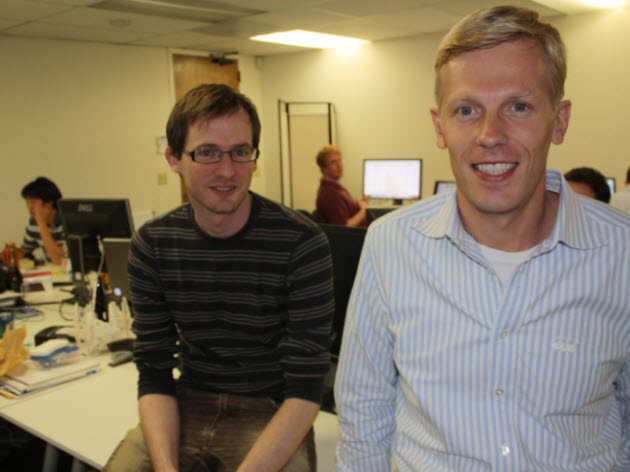
Nexon has pioneered free-to-play online games on the web over the past decade, with hits such as MapleStory getting more than 100 million registered users. But big downloadable games such as that one don’t work on Facebook, where the key is to deliver instantly loading casual games that take maybe 10 minutes or less for a snack-like play experience.
Nexon is slowly and deliberately expanding web-based online games to social network gaming, said Won Il Sue, vice president of business development at Nexon America, in an interview. Beyond the investment in A Bit Lucky, the company has other Facebook games in the works through outside game studios Antic and One2Tribe.
AI Weekly
The must-read newsletter for AI and Big Data industry written by Khari Johnson, Kyle Wiggers, and Seth Colaner.
Included with VentureBeat Insider and VentureBeat VIP memberships.
A Bit Lucky, formed by some hardcore industry game veterans including Frederic Descamps (pictured right) and Jordan Maynard (pictured left), started relatively late in November, 2009. Descamps and Maynard worked together on hardcore online games at Trion Worlds. They struck out on their own, raised money in February 2010 and launched their first game in June 2010. Lucky Train has held steady at around 1 million monthly active users for some time.
They were pretty late in starting a new game company on Facebook. Just before they started, Electronic Arts began a consolidation phase by purchasing Playfish for as much as $400 million. But Descamps, who was also a veteran of the startup Xfire, and Maynard were excited about the new opportunities in social games. Descamps started a regular social game entrepreneur party, partly to learn from others and partly to recruit employees. The parties have now grown to hundreds of people, a reflection of the buzz around social games in Silicon Valley. As we noted in our first story on them, it was a very social way for A Bit Lucky to dive into the social gaming universe.
Back in October, the average play session was about 13 minutes, which is about four or five times higher than the average play session for a Facebook game. Now it is about 20 minutes per session. About 20 million trains have been created, with 100 million train stops and 400 million round trips. That’s pretty good engagement.
One of the reasons the game did well was that the animation was fast for Facebook, where load times on social games can be painfully slow. The company also used Applifier, a promotion bar that is installed on top of the game and promotes a bunch of third-party games. Applifier helps games feed users to each other.
The market is still crowded, with bigger companies such as Zynga, Disney Playdom, EA-Playfish, CrowdStar, LOLapps, Digital Chocolate, Booyah and others — the list goes on and on. In the Facebook game space, it’s becoming harder to find spaces that others aren’t already occupying.
A Bit Lucky had previously raised $2.6 million from angels including SV Angel (Ron Conway’s firm), Chris Dixon’s Founder Collective, Aydin Senkut’s Felicis Ventures, Red Octane founders Charles and Kai Huang, IGN co-founder Mark Jung, Google M&A chief David Lawee, Lerer Ventures, Delicious founder Joshua Schachter, early Facebook employee Jed Stremel, and XG Ventures.
[aditude-amp id="medium1" targeting='{"env":"staging","page_type":"article","post_id":249955,"post_type":"story","post_chan":"none","tags":null,"ai":false,"category":"none","all_categories":"business,games,social,","session":"C"}']
Sue said that the market for social games has become overheated and the valuations are higher than normal because of the intense demand from investors to get into social game deals. But he said Nexon was very comfortable with Descamps and his team. Descamps said he fondly remembered visiting Nexon in South Korea to learn the ropes of free-to-play games while he was a graduate student at Stanford. Nexon had figured out how to make money from free-to-play, where users start playing for free and then pay real money for virtual goods, at a time when others either sold subscriptions or retail games. That’s the way that A Bit Lucky’s games work too.
Nexon will get a new seat on the board while Lawee of Google and Andrew Trader, co-founder of Zynga, will both be joining A Bit Lucky’s board of advisors.
VentureBeat's mission is to be a digital town square for technical decision-makers to gain knowledge about transformative enterprise technology and transact. Learn More
